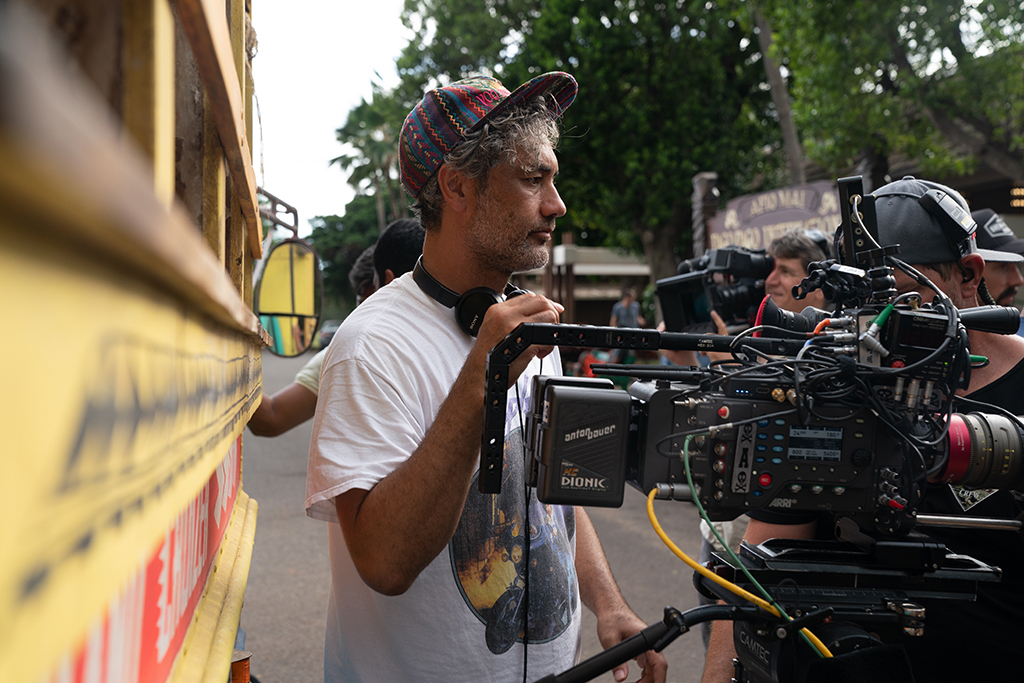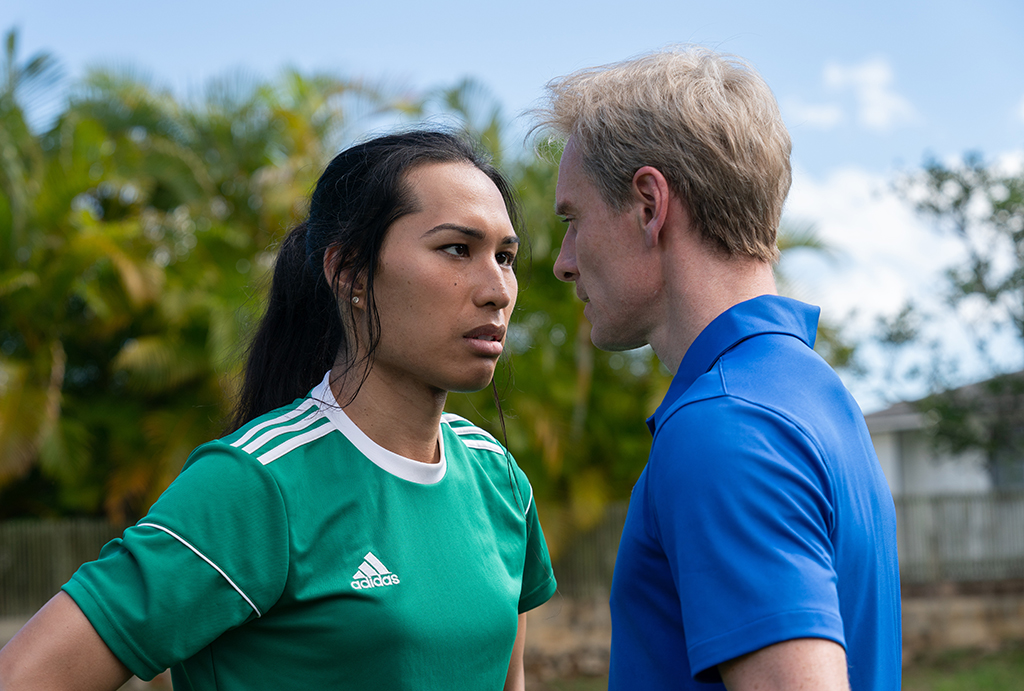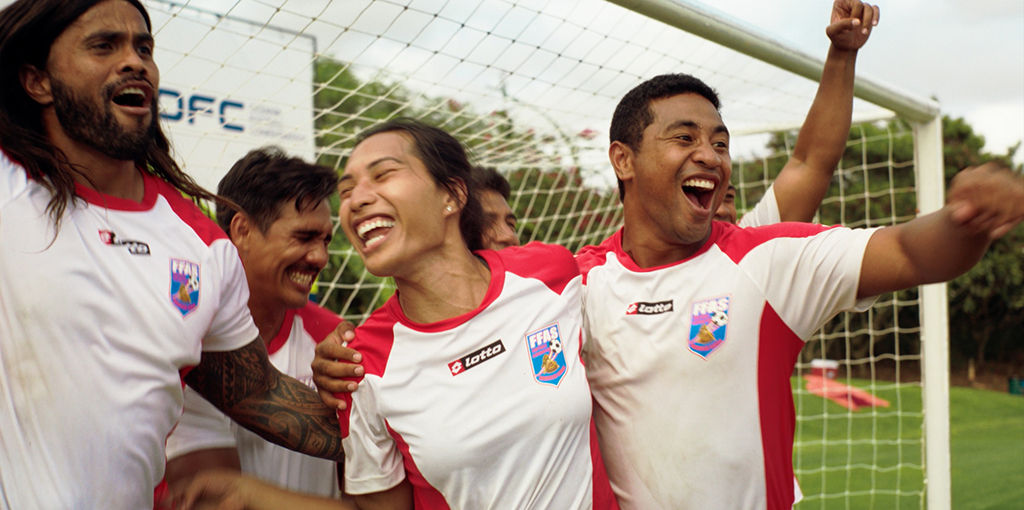By Kai Curry
NORTHWEST ASIAN WEEKLY
 “Next Goal Wins” is the best movie of the year. Forget the Barbie/Opie war of the summer. Go see this and remember what you’re supposed to be seeking in life—good movies and happiness.
“Next Goal Wins” is the best movie of the year. Forget the Barbie/Opie war of the summer. Go see this and remember what you’re supposed to be seeking in life—good movies and happiness.
At first, I was confused. What is New Zealander Taika Waititi doing at the beginning of the movie, acting as narrator in the form of a Samoan preacher with a Wild Bill Hickok moustache? Is this movie about a Samoan soccer team going to be weirdly unfathomable? Also, why is he narrating to me in the first place? Usually, I straight up detest being told how to think in movies. There’s another whole section of an elementary-school level introduction to American Samoa, which I guess is necessary (do NOT mix it up with the other Samoa), and sensical in that the new white soccer coach might need the explanation, but it still felt like I was getting preached at.

Taika Waititi on the set of NEXT GOAL WINS. (Photo by Hilary Bronwyn Gayle. Courtesy of Searchlight Pictures. © 2023 Searchlight Pictures)
But Waititi is kind of like Shakespeare in that after a few minutes, you’re in the groove with him. You’ve got to acclimate to his (not Shakespeare’s) choppy rhythm, New Zealander humor, and swirling vision, and trust that it’s going to coalesce into something beautiful. Which it does.
“Next Goal Wins” is inspired by the “real events” after the American Samoa soccer/football team spectacularly lost a qualifying match against Australia in 2001. (Not “based on,” which the movie industry tells us makes a big difference. “Based on” supposedly requires more adherence to facts. “Inspired by” allows the liberties that Waititi likes to take with, well, reality.)
The team is now even worse, and the head of the Football Federation of American Samoa, Tavita, played by Oscar Vai To’elau Kightley, is praying to God for “just one goal” in the qualifiers for the present FIFA World Cup. His is one of the only major roles played by an actual Samoan, which bugged me (and even Kightley grew up in New Zealand). Waititi seems to have brought his “crew” along with him, which, don’t get me wrong, I watch a lot of New Zealander and Aussie films, and I adore all of these folks. But could we really not find more Samoans?
Tavita fires their coach, who hates conflict, and the U.S. Soccer Federation sends him a new coach in the form of a walking anger issue, Thomas Rongen, a real life Dutch American man who is played by Michael Fassbender. On the surface, there was a danger of this becoming a white savior movie. The American Samoans in the film take care of that right away by mentioning it several times themselves and expressing their total rejection of such a concept.

Kaimana and Michael Fassbender in NEXT GOAL WINS. (Photo by Hilary Bronwyn Gayle. Courtesy of Searchlight Pictures. © 2023 Searchlight Pictures)
In fact, Rongen is not sent there to help the team at all. He’s sent there by “friends” in the Federation, including his estranged wife, who want him to heal from said estrangement, general failure as a coach, and a tragedy we don’t know about or even begin to suspect, which is giant kudos to Waititi, who directs and co-screen-wrote the film.
This is where another stereotype comes in: a white person going to the tropics to seek enlightenment and a personality reboot. To learn how to RELAX. Football is a game (it’s cool when you make this realization yourself, but damn annoying when other people tell it to you). “No, it’s a sport,” Rongen says, but he starts to get it. The American Samoa team doesn’t take negative reinforcement well, they play according to what they “feel,” they stop for prayer and Sundays, and yet at the same time they are all busting their asses, working multiple jobs so that they can fund the team and play at all. They do need someone to believe in them, not someone having a mental breakdown à la Ted Lasso. Rongen is terrible at talking to them or relating to them until Tavita, in a lovely sequence, tells him to stop living in the past “because you were happy there” and be happy now. Be here now. “Even right now you’re not here,” Tavita says.
One of the most important people in the movie is Jaiyah Tauasuesimeamativa Saelua, played by Kaimana. Saelua is a fa’afafine, a term that refers to having a third gender, being binary, or transgender. She is in the middle of transitioning and taking hormones, and warns Rongen that soon she won’t qualify to play on a men’s team. This is such a crucial current concern, with news items popping up daily about how the actual football world is dealing with this actual situation. It’s impressive how Waititi incorporates the controversy here, in such a loving way, and even more awesome that Saelua is a real person and a real American Samoan, who is now the FIFA ambassador for equality and advocates for LGBTQ+ athletes. The role, and the way everyone relates to Saelua, is approached in a new and natural way. It doesn’t go the way you think it will at all. So just wait. It’s hard to take Rongen yelling at her when they first meet, but it gets better. I’m grateful we are allowed to take the journey with them. It’s one of the best parts of the movie.

(From left): Hilo Pelesasa, Ioane Goodhue, Kaimana and Beulah Koale in NEXT GOAL WINS. (Photo Courtesy of Searchlight Pictures.© 2023 Searchlight Pictures)
Flashback to the 2000s when I lived in Hawaii. I used to go to this islander EPCOT of sorts which is called the Polynesian Cultural Center. I always thought it was kind of exploitative, but maybe it’s not. I don’t know what the people that work there, all hailing from the nations on display—Tahiti, Tonga, Samoa—think about the place. I can tell you that Pacific Islanders rarely go there “for fun”—it’s all Asian tourists, mainly Japanese and Korean, and U.S. tourists. But there’s a Samoan man, Sielu Avea, who is the star of the entire place. He’s hilarious, a natural showman, not to mention an actual chief back home, with the entire body tattoo and everything, and he has this line that he repeatedly says that all of the sudden trickled back to me while I was watching “Next Goal Wins.”
“We’re the happy people.” In the movie, we are all encouraged, even from unexpected sources, to be happy. “I just want you to be happy,” they all keep saying.
“Is it really like that?” my husband asked me as we were leaving the cinema. Is life in American Samoa (or the Independent State of Samoa) really happy? I answered that for one, yes, when you live on an island, it just feels different. It’s hard to stay angry standing on the beach under a palm tree looking at the ocean. But I also answered that I’m sure it’s much more complicated than that. There’s poverty, there’s racial tension, there’s the normal range of emotions that we all have, there’s regular life. But what I can say is that, like in “L.A. Story,” where Steve Martin’s character explains that a kiss is not just a kiss, but everything we “wish” it could be.
“Next Goal Wins” is not just a representation of Pacific island life, or of football, and it’s not just a movie.
It’s everything we wish it could be.
Kai can be reached at info@nwasianweekly.com.

